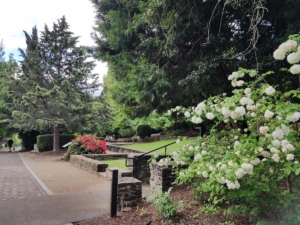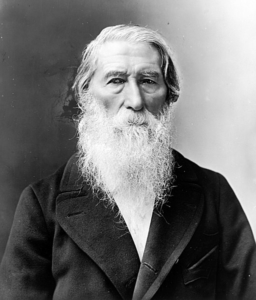SOULA archaeological research leads to historic designation for Britt Gardens
Seven months after the Southern Oregon University Laboratory of Anthropology was awarded a grant to analyze the Peter Britt Gardens, the site was accepted into the National Register of Historic Places by the National Park Service.
The Southern Oregon University Laboratory of Anthropology conducts archaeological research throughout southwest Oregon, allowing students to gain practical experience toward their anthropology major and the Cultural Resource Management certificate. SOULA works with the Coquille Indian Tribe, the U.S. Fish and Wildlife Service, the Medford District Bureau of Land Management (BLM), Oregon State Parks, Oregon Department of Transportation (ODOT), Jackson County and the Southern Oregon Historical Society.
Peter Britt settled in the Rogue Valley in 1852 and is best known for his early photography and agricultural innovations that helped spur the wine and pear industries in southern Oregon. He documented southern Oregon and its residents, and is credited with taking the first photograph of Crater Lake.
He created a formal garden on his property that was a cherished community space and a popular tourist destination. In 1960, 55 years after Britt’s death, his house and the connected garden burned down.
Oregon’s State Advisory Committee on Historic Preservation nominated the site to the National Register of Historic Places at its June 2019 meeting. Authorized by the National Historic Preservation Act of 1966, the register is part of a national program to coordinate and support public and private efforts to identify, evaluate and protect America’s historic and archeological resources.
Before the inclusion of the Britt Gardens Site, only nine individual properties in Jacksonville were listed in the register.
SOULA initially excavated the 4.5-acre Britt Gardens in 2010 and 2011, before funding dried up and prevented the hundreds of findings to be fully studied. However, the city of Jacksonville and the state Advisory Committee on Historic Preservation approved a $15,000 grant to continue SOULA’s anthropological research in August 2019, as part of an effort to reconstruct the historic site. The committee awarded 17 other similar grants.
SOULA’s research uncovered Peter Britt’s original log cabin on the property. According to Mark Tveskov, the director of SOULA and an associate professor of Anthropology at SOU, the cabin site is “rare and highly significant, as it is one of the earliest known cabin sites yet discovered and professionally excavated in the State of Jefferson.” The cabin was the initial home Britt lived in when he came to the Rogue Valley in 1852, before he began construction of a larger home in 1856.
As the reconstruction of the gardens continued, SOULA teamed up with the Hannon Library to digitize over 100 artifacts from the site. Of the 2,064 prints created by Peter Britt, 776 can be found on the Southern Oregon Digital Archives. SODA was created by the Hannon Library in the early 2000s with grants from the Institute of Museum and Library Services and the Oregon State Library.
Peter Britt Gardens was added to the National Registry of Historic Places last month, making it the 10th Jacksonville location to be added and the first addition since March 2000. “It is rare for archaeological sites to make this distinction, so we are all happy that the nomination made it all of the way through,” said SOU research archaeologist Chelsea Rose.
Listing in the National Register is the first step towards eligibility for National Park Service-administered federal preservation tax credits that have leveraged more than $45 billion in private investment and National Park Service grant programs. Britt Gardens hosts the Britt Festival, an outdoor music and performing arts festival.
Story by Blair Selph, SOU Marketing and Communications student writer



 The excavations by
The excavations by 